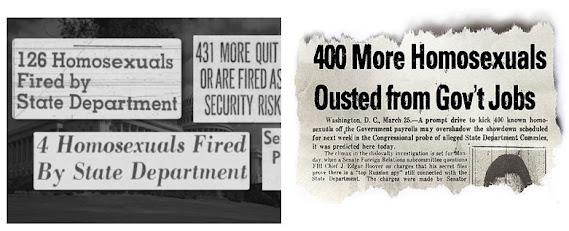November 27, 1950, in history, is a bit of an insignificant
date so a senate report that isn’t very famous released on this date doesn’t
really carry an impact, except this report to a large degree led to the historic “Lavender
Scare” of the 1950s when gay men and women were forced from public service in government
and military or from any business doing government work. Homosexuals and
lesbians being forcible outed is now considered immoral, but then it was often
considered an important part of U.S. National Security.
Officially titled “Employment of Homosexuals and Other Sex
Perverts in Government”, but better known as the Hoey Report, after Senator
Clyde Hoey, who chaired the senate committee declared that homosexuals “are not
proper persons to be employed in government.” (The derogatory term “perverts”
was freely and publicly used in these years.)
The report determined that the quality and characteristic of being
a homosexual were so extreme and unacceptable that one naturally kept it secret
and would go to great lengths to protect their privacy, and this made them easy
targets for blackmail. Despite its alarmist homophobic conclusion, the report
was unable to cite a single example of a homosexual government employee being
blackmailed into divulging sensitive national security information.
Regardless the report was so accepted across government, of
course, building on preconceived prejudices that it led to President Eisenhower issuing
Executive Order 10450, revising President Truman’s federal loyalty program and adding
the categories of “immoral” behavior and “sexual perversion” as grounds for
dismissing a federal employee as a “security risk”.
Sources:
shorturl.at/dqRTX
https://www.archives.gov/publications/prologue/2016/summer/lavender.html
https://www.archives.gov/federal-register/codification/executive-order/10450.html

No comments:
Post a Comment